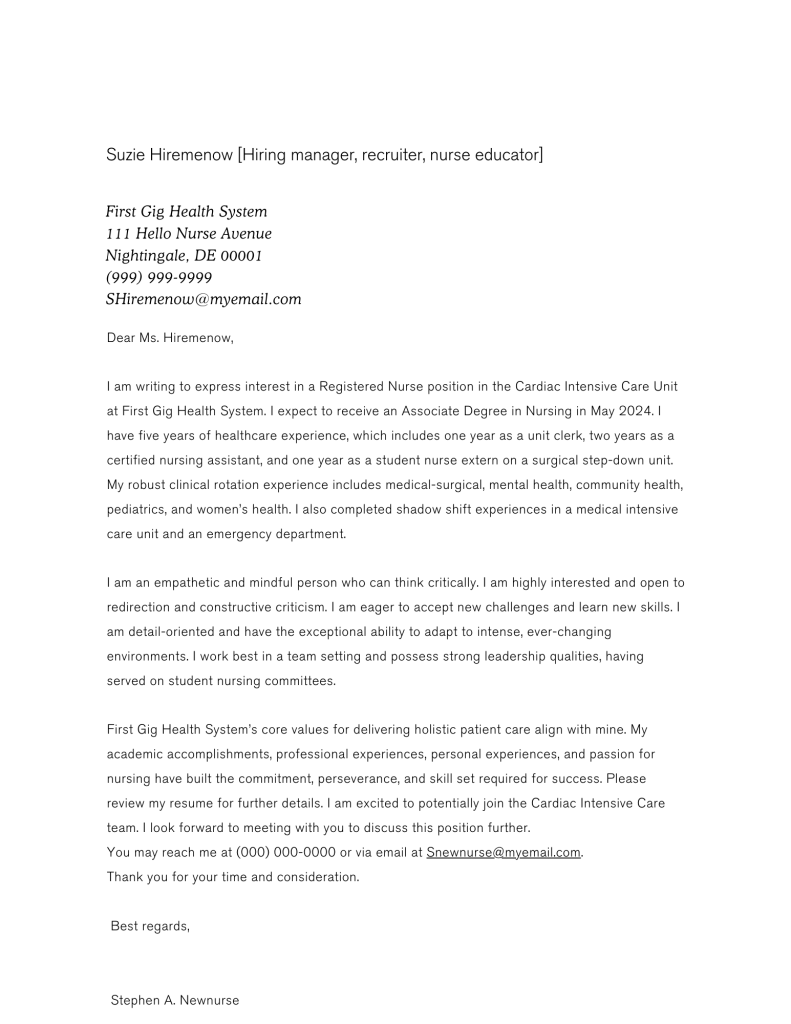Why do I Have to Write a Cover Letter?
You may wonder if hiring managers take the time to read cover letters. Several studies show that most hiring managers consider cover letters a vital part of hiring. Resumes give a high-level view of experience. Cover letters complement the resume to provide a more holistic view of how your experience and qualities connect to the job qualifications. Do this in the least complicated way – Simple is best.
Greeting: It is straightforward to automatically type, “To Whom It May Concern” as the greeting to a cover letter. The common thought is that anyone can read the letter; therefore, this salutation covers all the bases. But I encourage you to consider a different perspective. Many of us are “detail-oriented” when asked what makes us a good candidate for the job. Who doesn’t want a detail-oriented nurse? To be safe, read the job posting carefully for instructions on who to address your cover letter to. Sometimes, the posting will provide the hiring manager’s name, department head, recruiter, nurse educator, or search committee. If the posting does not include a name, there is nothing wrong with contacting human resources to clarify who the addressee should be.
The greeting “to whom it concerns” may not always be a dealbreaker, but if the job posting states to address your cover letter to “Suzie Hiremenow,” and you do not do that, it may skew the view about your ability to pay proper attention to detail.
Purpose/Intent: Start by explaining why you are writing the letter: “I am writing this letter to express interest in the [name of job title] position at [name of organization].”
Experience: If you are applying before graduation, state where and when you are scheduled to graduate. If you have already graduated, state that you have received your degree. Include the academic institution with the graduation month and year. As a nursing student and new graduate nurse, a summary of experience is essential to your cover letter.
If you have been employed or are currently employed in a healthcare setting, this is a great place to state how many years of collective experience you have. You do not need to include dates or the specific names of your clinical sites, as they should be included in your resume. For example, refrain from statements like” I completed my pediatric clinical rotation at Kids Be Well Hospital from March 2023-May 2023.” A synopsis of the type of clinical rotations you experienced will suffice.
Strengths: Now, it is time to toot your own horn. After all the hard work you’ve put in over the years, you deserve to acknowledge how you have grown and what will make you a great asset to your new place of employment. Be honest in this section. You do not need to use all the cliché qualities, especially if they are not true to who you are. Choose qualities that genuinely describe you and are relevant to the area where you wish to work. Read the job description and pull-out essential qualifications that match your qualities. Here are a few admirable qualities. A thesaurus works wonders as well:
- adaptable to rapid change
- autonomous
- critical thinker
- detail-oriented
- eager to learn new skills
- effective communicator
- empathetic
- flexible
- inquisitive
- leader
- not afraid to ask questions
- open to direction and constructive criticism
- organized
- resourceful
- self-motivated
- seeks new knowledge
- skilled in decision-making
- solutions-oriented
- teachable
- team player
- willing to accept new challenges
Remember that what you state in your cover letter should match what you say in the interview. Authenticity is critical, and interviewers can spot inconsistencies.
Closing: Finish strong! Emphasize your belief that your experience and qualities make you a strong candidate for this position. Research the organization’s core values and affirm how they align with your values. Express your interest and excitement to be a part of the team. Personalize this statement by stating the name of the organization or department. Encourage the reader to review your resume for further detail. Provide your contact details to allow the hiring team to gain additional information. Thank the readers for their time and consideration.










